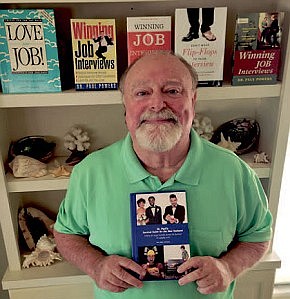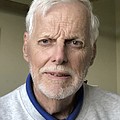Notable Neighbors
April 7, 2023 at 11:27 a.m.

Paul did find relief in music. He was a member of the high school band while still in grade school, and he played the organ in church on Sundays. He graduated from high school in 1970, when the unpopular war in Vietnam was in full swing. He was interested in politics and thought he might like to get a law degree, but he knew his name was coming up at the local U.S. Army draft board, and rather than get drafted, he volunteered for the U.S. Marine Corps. Say what? Well, there was a method in his madness. Having survived the disciplinary trials of his parents and the nuns, he was ready for some REAL discipline in the military. He got it at Paris Island in basic training and Camp Lejeune in combat training. “I started at the bottom as a buck private and worked my way up to a noncom rank in 13 months. It was good for me,” he says. “I got over my fear of heights and risk-taking, and built my confidence in myself.” It made him a man.
Though his unit was deployed to Nam, he missed out through a typical military mix-up, and he ended up at Camp Pendleton in sunny southern California as a communications specialist. While there he found time to take a couple of night school courses for college credit as well. Paul was released from active duty in 1972 (though he didn’t get his honorable discharge until he completed another four years in the inactive reserve). When he got home he applied to Harvard University under the GI Bill and was accepted, but he felt out of place in its Ivy League way of life and the strong antiwar atmosphere there. After one semester he switched to the University of Massachusetts in Amherst. It was a move that changed his life and career.
At UMass he got a single room under a work/study program, and as a Massachusetts veteran his tuition was waived. “All I had to do was pay for my meals,” he recalls, so he had the financial means to keep on going to school – earning a bachelor’s degree in psychology in 1974, a master’s degree in psychology in 1975 and a doctorate in psychology in 1979. That gave him status and opportunity: a doctorate degree is a key that will open many doors. He would just have to decide which door – or doors – to open.
Paul gained valuable experience in cognitive behavioral therapy during his years at
UMass by working with patients at the nearby Veterans Administration hospital in Northampton. Most patients were being treated for what was called post-traumatic stress disorder or PTSD. “What I learned is that PTSD is not a disorder, it is a natural reaction to stress, just as pulling your finger away from a hot stove is. If we could get the patient to accept that premise and then get involved in any activity to occupy his time and thoughts, he could get through it.” It was a valuable lesson that could be applied to many situations: accept your condition as a natural reaction and do something about it. “We were getting them jobs, apprenticeships, getting them out of the hospital and not coming back. In 1977 the head of the VA authorized a study of all its hospitals, and we had the lowest recidivism rate in the country. A colleague and I wrote up our program, and the VA assigned us to visit all its hospitals in the country – he in the west and me in the east – and tell them what we were doing. The VA turned me into a consultant!”
Paul did a postdoctoral year in Boston and took a part-time job with University Center, Inc., a private practice firm that did vocational counseling and management training. When his boss at the firm retired in 1981, Paul left too. “He was my chief, my companion, my mentor,” he avers. “There was nothing there for me once he left.” While getting his license from the state that year, Paul noticed a lot of errors and inconsistencies in the process, and he wrote an article criticizing it. Lo and behold, he soon got a call from Governor Ed King’s office, asking him to come in and talk to the Governor himself. The visit resulted in his getting appointed to the Massachusetts Board of Registration in Psychology. While it was a nonpaying assignment, it was a feather in his hat that added to his experience and visibility in the field of management psychology.
After leaving UCI, Paul connected with the owner of a successful employment agency who was starting a separate entity called Keystone Associates, which would provide outplacement counseling and assistance for executives who had been fired or resigned their job in a dispute. It was a new field then, and over a period of three years it gave Paul experience and contacts with high-level executives at companies large and small.
He left Keystone in 1985, the year he married Linda Spitzer, a commercial artist and designer and a friend of his secretary at Keystone. “Our first date was on August 10, 1984, and I married her a year later on August 10,” he recalls. “She was, and still is, the nicest person I have ever met.” That’s at least one reason they’re still together after 37 years and counting.
Paul’s next job was with an executive search company, Fenwick, which had clients mostly in the high-tech sector, many of them located along Route 128 in the Bedford/Lexington area. This was in one sense a complete switch from outplacement. Now he was helping owners and senior executives find highly qualified men and women to join their firm. This involved consulting with them on their needs, finding and interviewing candidates, arranging for them to meet their potential boss, winnowing the list of candidates, doing extensive background checks on the final few candidates in some cases, and helping in the negotiations in many cases. It also involved extensive travel to visit the candidates in their home cities. “I spent time in every airline club in the country,” Paul swears. But it was a lucrative business, it broadened Paul’s experience and kept him in touch with high-level executives around the country.
In 1988 he decided to go into business for himself. His company: Dr. Paul Powers, Management Psychologist. A lot of his contacts were young and new in business, who understood the technology but were inexperienced in solving the many problems of personnel management that come up in business. “I became in effect their consigliere, offering them counsel,” he says. “One of my clients told me, ‘I pay you to be around because I enjoy your company, you keep me from being stupid, and you’re cheaper than a lawyer.’ ”
Paul’s business thrived, and it found him giving seminars, making appearances on TV and radio and writing articles, newsletters and books – his first one entitled “Love Your Job,” a perfect metaphor for his philosophy. During that time, he says he and Linda “made an active decision to spend about 10 percent of our time on pro-bono activities that were in line with our values. Being our own bosses gave us the flexibility and time to do that, and it gave us both a lot of personal satisfaction.” But in 2006, after 25-plus years of full-time activity, he and Linda decided to cut back a bit. They sold their house in Wellesley and moved to the small town of Englewood, Florida. “We love it here,” he says. “It’s got music, beaches, some good restaurants, and it’s close to Venice and Sarasota, which have many excellent cultural and social activities to offer.”
But “cutting back” is strictly a relative term. Having already established himself as an author, a motivational speaker and a frequent guest on television and radio shows, he became what he calls a “retirement coach” as well, offering his expertise to those folks entering their golden years. His just-published humorous book on becoming a husband is one example. Another is an e-newsletter he’s created entitled “LifeMap,” giving common-sense advice on spending your efforts. Some sample topics: “Remembrance & Appreciation,” “The Gift of Laughter,” ‘Four-day Work Week,” and “Social Connections = Better Health.”
Suffice it to say that Paul’s not done, but he has lived a life that took him from a troubled beginning to one of fulfillment and success. Even Charles Dickens himself couldn’t have sketched the scenario any better.
Dean Laux is exploring interesting folks living in our community. If you know of anyone with an interesting background please send an email to: [email protected]. Include the person’s name, contact info and give a brief description of the person's background.
